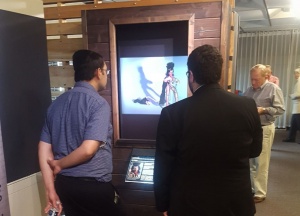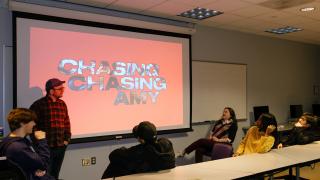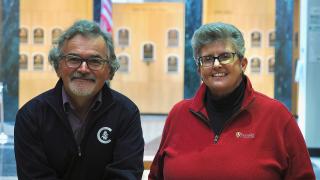

Our imagination of life in Nazi concentration camps is dominated by darkness, delineated by concepts difficult to fully comprehend: slave labor, extreme hunger, roundups, selection, and overwhelming—and after a while normalized—death. The Forbidden Art exhibition brings viewers a new perspective on concentration camp violence. It speaks to us, from the most authentic source, about the power of the human spirit and the ability to endure in the face of abominable conditions.
The exhibition, which is divided into two themes, features high quality reproductions of 20 artworks, many created under the threat of death. The first theme gives viewers a glimpse of daily camp life, and the remaining pieces invite reflection on the role of art as a mental escape. In this sense, art became a survival strategy. It could be a mental respite, a tool for imagining a different world, a gift of appreciation for human kindness that one experienced in a camp, or a way to build or change one’s social position. Art was also a way to document the present world as a testimony and a challenge to the world that would come after. Some of the work exhibited was produced by amateurs and some was created by accomplished artists who continued haunting their audiences with powerful images after the war.
Most of the works reflect the desperate conditions under which they were created, the lack of supplies and the human need for creative expression to sustain one’s spirit. Our understanding of art is challenged while viewing these illegal works; art ceases to be only a reflection of life, but rather becomes life.
Forbidden Art will be on view from September 18 to December 23 (noon). Gallery hours are Monday-Friday, 9 a.m.-5 p.m.
Additional gallery presentations and installations include:
- October 13, 6-8 p.m.: "Memory and Memorialization at Auschwitz," presentation by Jonathan Huener, associate professor of history, University of Vermont
- October 25, 6-8 p.m.: "Musical Remembrances of Love and Death from Auschwitz-Birkenau," presentation by Barbara Milewski, associate professor of music, Swarthmore College
- Visual artist Wojtek Sawa will present his installation piece The Walls Speak in the Mardigian Library. This powerful work illustrates the stories of Polish children placed in subhuman circumstances during World War II. Sawa will teach a student workshop on the gathering, processing, and interpreting of oral histories. (dates TBD)
--- Anna Muller, Assistant Professor of Social Sciences, UM-Dearborn





